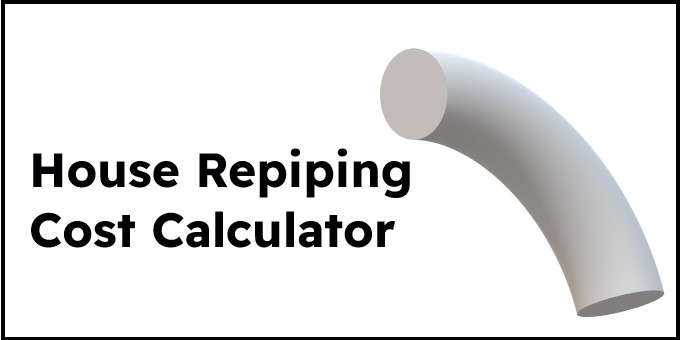Want to estimate how much it’ll cost you to replumb your house ? Use the house repiping cost calculator to find out easily. It’s free and easy to use.
House Repiping Cost Calculator
The House Repiping Cost Calculator is a tool designed to estimate the cost of repiping a house based on various factors such as the total area of the house, number of stories, number of baths, type of pipe materials, whether a permit is required, and additional services like water main replacement and drywall repair. It provides users with a quick and convenient way to get an approximate cost range for replumbing their home, helping them plan and budget for this essential maintenance task.
How the house repiping cost calculator works:
Input Information: Users input details such as the total area of their house, number of stories (single or multi), number of baths, number of other fixtures (toilet, sink, shower), type of pipe materials (Pex Pipes, CPVC Pipes, Copper Pipes), whether a permit is required, and if additional services like water main replacement and drywall repair are needed.
Calculation: The calculator processes this information using predefined cost ranges for each parameter. It calculates the estimated cost based on the input values, taking into account factors like the size of the house, complexity of the plumbing system, materials used, and labor costs.
Display Results: After the calculation, the calculator displays an estimated cost range for repiping the house. This range gives users an idea of the minimum and maximum expenses they might incur for the repiping project
FAQs about the house repiping cost calculator
1. How accurate is the estimated cost provided by the calculator? The estimated cost provided by the house repiping calculator is based on predefined cost ranges for each parameter, and the national average of costs like pipe, labour , home inspection and many more.While it gives users a good approximation of the repiping expenses, actual costs may vary depending on factors like local labor rates, material prices, and specific requirements of the house.
2. Do I need to hire a professional plumber for repiping my house? Repiping is a complex plumbing task that typically requires the expertise of a licensed plumber. Hiring a professional ensures that the job is done correctly, minimizing the risk of leaks, water damage, and other problems. It's recommended to consult with a plumber to assess your specific needs and get an accurate cost estimate.
3. Can I save money by doing the repiping myself? : While DIY repiping may seem like a cost-saving option, it's not recommended unless you have extensive plumbing experience and knowledge. Mistakes made during the repiping process can lead to costly repairs and damage. Hiring a professional plumber may initially seem more expensive, but it ensures the job is done safely and efficiently, potentially saving you money in the long run.

Is Your Home in Need of Repiping?
The plumbing system is the lifeblood of any home, But what happens when those once-reliable pipes start to falter? Leaks, low water pressure, and discolored water can all be signs of a bigger problem: aging or damaged pipes. Left unchecked, these issues can lead to expensive repairs and even structural damage.
This is where repiping, comes in. It's the process of replacing your entire existing plumbing system with new pipes. While it's a significant undertaking, repiping can breathe new life into your plumbing system, ensuring clean water flow and peace of mind for years to come. But how do you know if your home needs repiping?
When Does Your Home Need a Repipe?
Several signs can indicate the need for a repipe. Here are a few key ones:
Frequent leaks: Springs sprung, drips galore? Frequent leaks can signify widespread pipe corrosion or deterioration.
Low water pressure: Struggling showers and sluggish faucets can point to constricted pipes due to mineral buildup or internal corrosion.
Discolored water: Rusty or reddish water is a telltale sign of rust within the pipes, compromising water quality.
Material breakdown: Homes built before the 1960s might have used galvanized steel pipes, prone to rust and corrosion. Similarly, older copper pipes can develop pinhole leaks over time.
Extensive renovations: If you're planning a major renovation that involves exposing a significant portion of your plumbing system, a repipe might be a wise investment to avoid future disruptions.
If you're experiencing any of these issues, consider consulting a licensed plumber. They can assess your plumbing system's condition and recommend the best course of action, which might include repairs or a complete repipe.
Factors that Affect the Cost of Replumbing Your Home
The cost of repiping your home can vary depending on several factors. Here's a breakdown of some key influences:
Size of your house: Larger homes naturally require more pipes, translating to higher material and labor costs. Use a house repipe cost calculator to get a rough estimate based on your square footage.
Chosen pipe material: Copper pipes are considered the most durable option, but also the most expensive. PEX, a flexible and corrosion-resistant alternative, is gaining popularity due to its affordability and ease of installation. Consider consulting a plumber about the best material for your needs and budget.
Accessibility of pipes: Exposed pipes are easier and cheaper to replace compared to pipes hidden behind walls or under concrete slabs.
Labor costs: Labor rates can vary depending on your location and the complexity of the job.
Number of fixtures: The number of bathrooms, sinks, and other plumbing fixtures in your home can impact the total number of pipes needing replacement.
Pro tip: Use the house repiping cost calculator to estimate how much it’ll cost you. This tool can provide a preliminary estimate based on your home's size, chosen pipe material, and number of fixture. However, for a more accurate quote, it's crucial to consult a licensed plumber who can assess your specific situation.
Check out other tools
Idling fuel calculator | Bowling ball weight calculator
